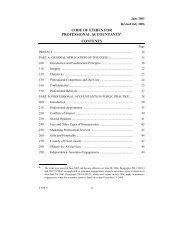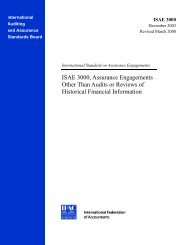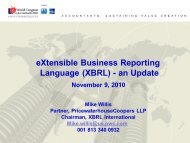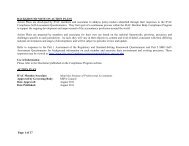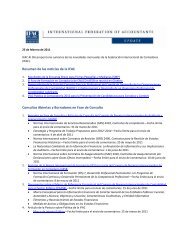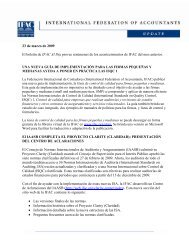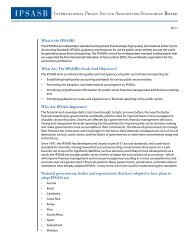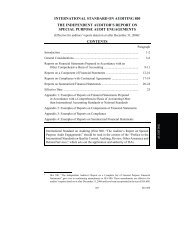ipsas 29—financial instruments: recognition and measurement - IFAC
ipsas 29—financial instruments: recognition and measurement - IFAC
ipsas 29—financial instruments: recognition and measurement - IFAC
You also want an ePaper? Increase the reach of your titles
YUMPU automatically turns print PDFs into web optimized ePapers that Google loves.
FINANCIAL INSTRUMENTS: RECOGNITION AND MEASUREMENT<br />
The same answer would apply if Entity A <strong>and</strong> Entity B did not have a netting agreement,<br />
because the definition of a derivative instrument in IPSAS 29.10 does not require net<br />
settlement.<br />
B.6 Definition of a Derivative: Option Not Expected to be Exercised<br />
The definition of a derivative in IPSAS 29.10 requires that the instrument “is<br />
settled at a future date.” Is this criterion met even if an option is expected not to<br />
be exercised, for example, because it is out of the money?<br />
Yes. An option is settled upon exercise or at its maturity. Expiry at maturity is a form<br />
of settlement even though there is no additional exchange of consideration.<br />
B.7 Definition of a Derivative: Foreign Currency Contract Based on Sales<br />
Volume<br />
A South African entity, Entity XYZ, whose functional currency is the South<br />
African r<strong>and</strong>, sells electricity to Mozambique denominated in US dollars. XYZ<br />
enters into a contract with an investment bank to convert US dollars to r<strong>and</strong> at<br />
a fixed exchange rate. The contract requires XYZ to remit r<strong>and</strong> based on its<br />
sales volume in Mozambique in exchange for US dollars at a fixed exchange rate<br />
of 6.00. Is that contract a derivative?<br />
Yes. The contract has two underlying variables (the foreign exchange rate <strong>and</strong> the<br />
volume of sales), no initial net investment or an initial net investment that is smaller<br />
than would be required for other types of contracts that would be expected to have a<br />
similar response to changes in market factors, <strong>and</strong> a payment provision. IPSAS 29<br />
does not exclude from its scope derivatives that are based on sales volume.<br />
B.8 Definition of a Derivative: Prepaid Forward<br />
An entity enters into a forward contract to purchase shares of stock in one year<br />
at the forward price. It prepays at inception based on the current price of the<br />
shares. Is the forward contract a derivative?<br />
No. The forward contract fails the “no initial net investment or an initial net investment<br />
that is smaller than would be required for other types of contracts that would be<br />
expected to have a similar response to changes in market factors” test for a derivative.<br />
To illustrate: Entity XYZ enters into a forward contract to purchase one million T<br />
ordinary shares in one year. The current market price of T is CU50 per share; the oneyear<br />
forward price of T is CU55 per share. XYZ is required to prepay the forward<br />
contract at inception with a CU50 million payment. The initial investment in the forward<br />
contract of CU50 million is less than the notional amount applied to the underlying, one<br />
million shares at the forward price of CU55 per share, i.e., CU55 million. However, the<br />
initial net investment approximates the investment that would be required for other types<br />
of contracts that would be expected to have a similar response to changes in market<br />
factors because T’s shares could be purchased at inception for the same price of CU50.<br />
1163<br />
IPSAS 29 IMPLEMENTATION GUIDANCE<br />
PUBLIC SECTOR


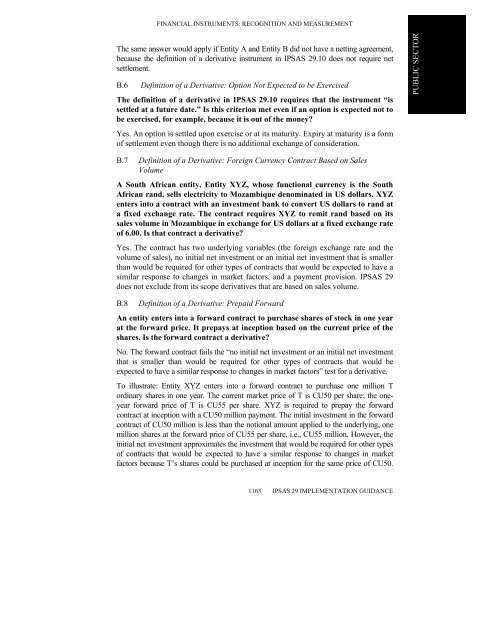
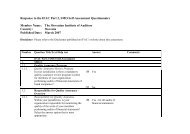
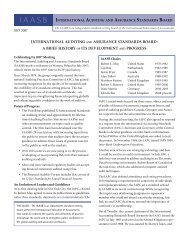
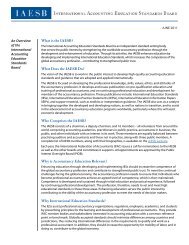
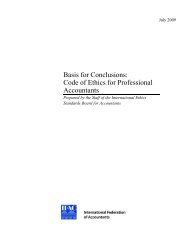
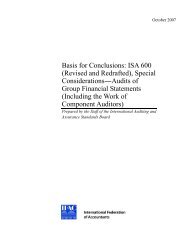
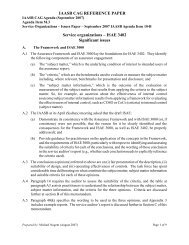
![International Auditing and Assurance Standards Board [IAASB] - IFAC](https://img.yumpu.com/22522144/1/190x245/international-auditing-and-assurance-standards-board-iaasb-ifac.jpg?quality=85)
